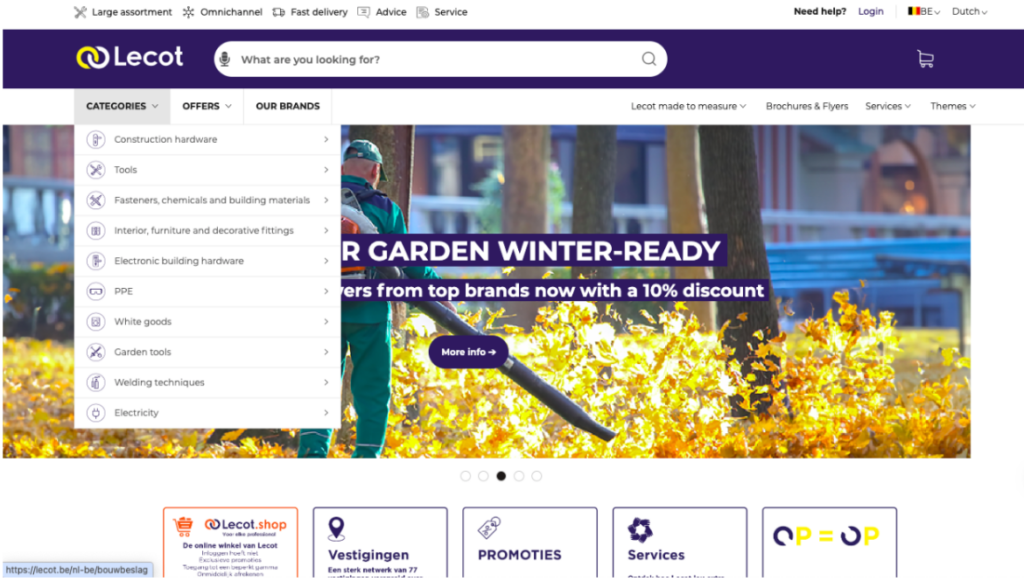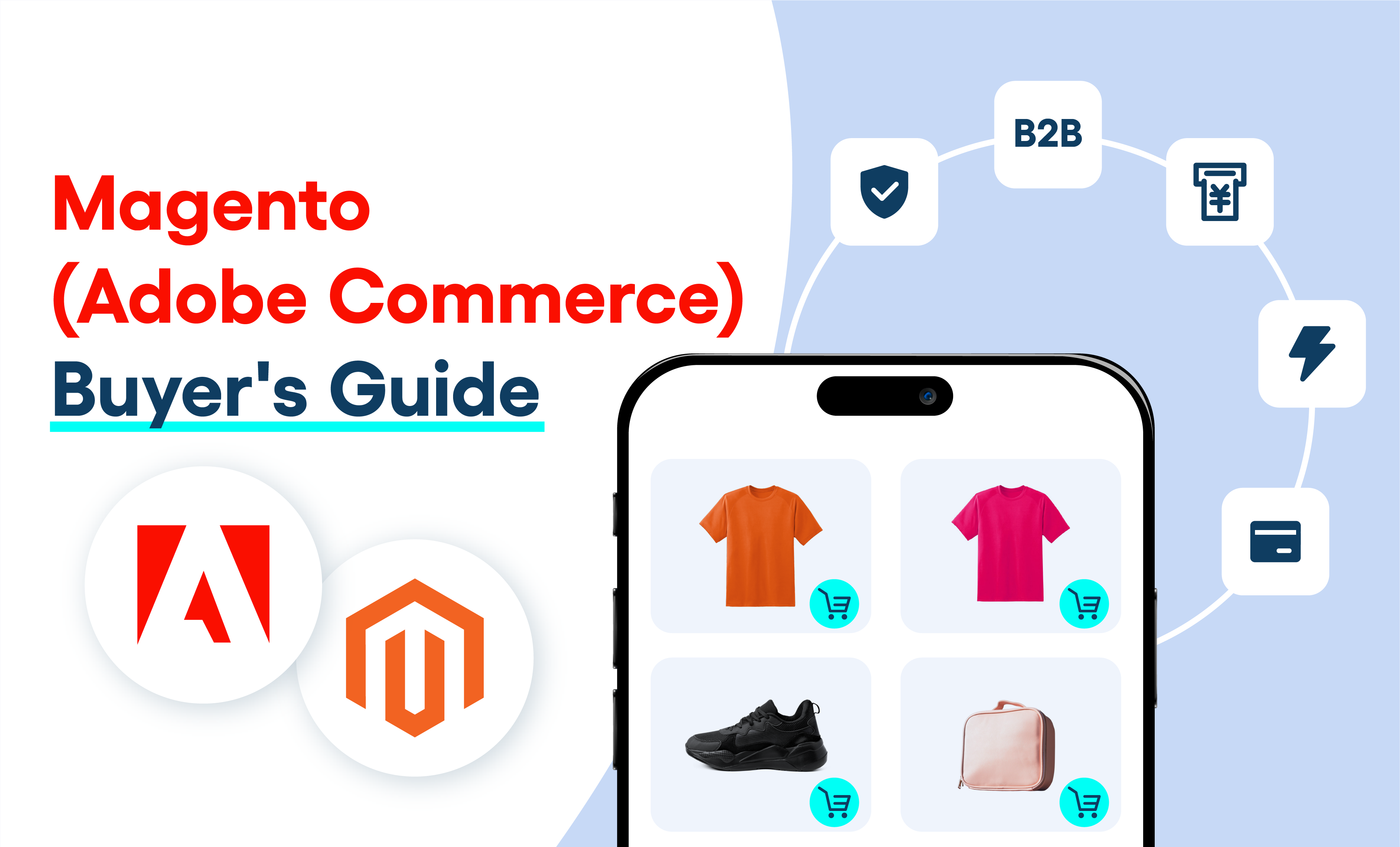Choosing the right eCommerce platform is a pivotal decision that impacts your business’s growth trajectory. It influences everything from how you manage your products and customers to how efficiently you scale your operations as you expand into new markets. Known for its flexibility, scalability, and rich feature set, Magento stands out as an ideal solution for businesses looking to offer exceptional customer experiences, manage complex catalogs, and scale globally.
To see how Magento fares against other solutions like Shopify, you can read our eCommerce Platform Comparison: Magento, Shopify, & moreFrom entry-level site builders to powerful eCommerce solutions, we ranked the top platforms, as well as their advantages and disadvantages.eCommerce Platform Comparison
As businesses grow, their eCommerce requirements become more complex. In this post, we’ll explore some industries and use cases for which using Magento is currently one of the top options in the market based on our experience as an eCommerce Services Provider.
Magento Overview: Why It's a Leading Choice
Magento is a powerful, open-source eCommerce platform that provides businesses with full control over their online stores. It offers an extensive set of features that make it a compelling choice for businesses of all sizes and industries.
Key advantages include:
- Customization: Magento allows you to tailor your store to fit your brand and business needs, whether through design or functionality.
- Scalability: As your business grows, Magento can easily scale to accommodate larger product catalogs, more customer data, and higher traffic volumes.
- Security: Magento’s strong security features protect both your business and customer data, ensuring compliance with the latest industry standards.
- Integration Capabilities: Magento integrates seamlessly with various third-party tools and systems, including CRM, ERP, and payment gateways.
Magento's flexibility makes it suitable for both B2B and B2C businesses, supporting a wide range of use cases from complex product catalogs to sophisticated pricing models and personalized shopping experiences.
We extensively cover Adobe Commerce and Magento's costs, options, and other considerations in our 2025 Buyer's Guide for Magento (Adobe Commerce): Costs, Features & AlternativesWe cover the ins and outs of Adobe Commerce (Magento) in order to help you make the best choice for your business, exploring key functionalities, use cases, and examples of successful implementations.Adobe Commerce Buyer's Guide.
Industries That Benefit Most from Magento
1. Biotech and Pharma
The biotech and pharmaceutical industries are subject to stringent regulatory requirements, with products needing to comply with varying laws and standards across different regions. Thanks to Magento's customization and compliance management options, companies can meet the regulatory demands of agencies like the FDA.
- The platform’s ability to manage complex product catalogs makes it ideal for displaying detailed drug specifications, health product attributes, and other crucial information.
- Magento also supports multi-channel sales, enabling businesses to simultaneously operate B2B and B2C models to cater to diverse customer groups.
- For consumers who require regular medication refills, Magento’s subscription service functionality offers a seamless automatic replenishment experience.
- Robust B2B features accommodate bulk purchases, dynamic pricing strategies, and credit payments, making it well-suited for pharmaceutical suppliers, hospitals, and clinics. Its
- Global and multilingual capabilities further enhance its value for multinational pharmaceutical companies, providing localized shopping experiences across various markets.
For a practical application, see Henry ScheinHenry Schein streamlines B2B purchases with automatic order fulfillment that integrates into systems like ERP for a modern B2B experience across platforms.how TMO helped a global leader in dental, pharmaceutical, and animal health products implement multiregional Magento to manage its complex product catalog and special pricing requirements.
2. Electronics and Technology Industry
The electronics and technology industry is characterized by rapid product updates, a wide range of product types, intense market competition, global user bases, and high demands for user experience.
- Electronics products often feature multiple models, configurations, and accessories, such as mobile phones and laptops. Magento enables businesses to manage complex product attributes and variants, providing flexible options for different configurations.
- Magento’s inventory management system efficiently handles a large volume of SKUs, making it well-suited for the diverse needs of the electronics industry.
- Technology companies also have stringent requirements for data security, particularly concerning payment processing and customer information protection. Magento offers robust security features, including PCI compliance, regular security patch updates, and customizable server deployment options.
- Magento’s open-source architecture and comprehensive API support enable easy integration with external technology solutions.

3. B2B Enterprises
Magento is well-equipped to handle complex procurement processes, customized service requirements, and provide flexible customer management and payment methods. For B2B companies that need to manage large amounts of product data, intricate pricing rules, and multi-tier customer structures, Magento delivers highly customizable solutions:
- Customized Pricing: Offer personalized pricing based on customer type and needs.
- Bulk Purchasing Support: Easily add large quantities of items through SKU or CSV files.
- Multi-Level Approval Process: Supports complex permission settings and procurement approvals.
- Role and Permission Management: Assign different access levels based on employee or partner roles.
- Complex Product Data Management: Efficiently manage large SKUs and apply multiple filters and classifications.
- Credit and Installment Payment: Flexible payment options for large orders.
- Multi-Site and Multi-Language Support: Operate multiple sites with localized language and currency features.
- Multi-Channel Sales Management: Unify management of both online and offline sales channels.
For successful Magento B2B Implementations, check out TMO's eCommerce Customer Success Stories.
One of the key features Magento offers is customized pricing. Businesses can set exclusive prices based on customers' purchasing history or specific customer segments. The platform also supports bulk purchasing, allowing customers to place orders quickly via SKU or CSV files, simplifying the procurement process and speeding up conversions. Additionally, Magento includes a multi-level approval process, enabling enterprises to set various permissions to support complex procurement decisions and approval workflows. With the role and permission management functionality, businesses can control employee and partner access levels, ensuring security and compliance throughout the procurement process.
Magento’s product data management capabilities help companies efficiently handle large numbers of SKUs, ensuring they are accurately categorized and organized according to various attributes. For B2B companies, Magento also offers credit payment and installment payment options, providing flexible payment plans for larger orders. Furthermore, Magento supports multi-site, multi-language, and multi-currency features, allowing companies to offer localized services across the globe.
Magento also integrates multi-channel sales management, enabling businesses to manage online and offline orders through a unified platform. The powerful customer center lets businesses offer customers the ability to manage orders, view invoices, and track shipments. Overall, Magento streamlines the entire sales and procurement process with its highly flexible and scalable B2B features.
Use Cases Where Magento (Adobe Commerce) Shines
Either through powerful out-of-the-box features as well as due to its highly customizable environment, Magento can prove particularly useful for businesses that need flexibility in their implementation of eCommerce:
- Multi-Store Management: Magento’s ability to manage multiple stores from a single admin panel makes it ideal for businesses with multiple brands, regional markets, or international operations.
- Complex Catalogs: Businesses with a wide variety of products, such as those in retail or technology, benefit from Magento’s robust catalog management tools, which allow them to organize products based on complex attributes.
- High-Volume eCommerce: For businesses expecting large-scale orders, high transaction volumes or seasonal traffic spikes, Magento’s scalability ensures that your store can handle increased demand without compromising performance.
- Omnichannel Integration: Magento supports omnichannel experiences by integrating online and offline sales channels, enabling businesses to deliver a seamless shopping experience regardless of where the customer engages.
- Custom Functionality Needs: Businesses with specialized requirements for custom features, integrations, or business logic will appreciate Magento’s ability to develop tailored solutions that meet specific needs.
Furthermore, Magento is an excellent choice for businesses looking to scale internationally. With built-in support for multi-currency, multi-language, and localized content, Magento allows businesses to effortlessly expand into new markets. Whether you’re looking to sell globally or expand regionally, Magento’s features ensure you can deliver a localized experience to customers across the world:
- Multi-Currency and Multi-Language Support: Magento allows businesses to offer different currencies and languages based on the customer’s location, making it easier to cater to global audiences.
- Localization Capabilities: With Magento, you can customize the shopping experience for local markets, including product pricing, promotions, and delivery options.
- Global Payment Gateways: Magento integrates with a wide range of international payment systems, allowing businesses to offer multiple secure payment methods to customers.
- Shipping and Tax Management: Magento’s shipping and tax rules can be tailored to meet the specific requirements of different regions, ensuring compliance and smooth operations in various countries.
- Full Ownership and Data Control: Magento gives businesses full control over their website data and business processes. Businesses can choose to host their own servers or use cloud hosting as needed to ensure data security. For businesses involving cross-border data transmission and storage, customized development may be required to meet the data protection regulations of different countries or regions.
Developing Magento to its full potential with TMO
Magento is a powerful, flexible eCommerce platform that supports a wide range of industries and use cases. From retail and B2B to cross-border eCommerce and global expansion, Magento offers a robust solution for businesses looking to grow, scale, and provide exceptional customer experiences.
At TMO Group, we specialize in helping businesses navigate the complexities of Adobe Commerce. From initial consultations to full-fledged implementations, we provide end-to-end support to ensure your eCommerce platform is optimized for success.
Our Adobe Commerce (Magento) Services include:
- Magento Custom Development: Tailored solutions to meet your specific business needs.
- Seamless Migrations: Transitioning from other platforms to Magento without disrupting your operations.
- Ongoing Support and Optimization: Ensuring your Magento store runs smoothly and stays updated with the latest features.
- Global Expansion: Leveraging Magento’s cross-border eCommerce features to help you scale internationally.
Ready to take your Magento Commerce store to the next level? Contact us today to discuss how we can help you optimize your store for better performance, enhanced security, and increased conversions.









